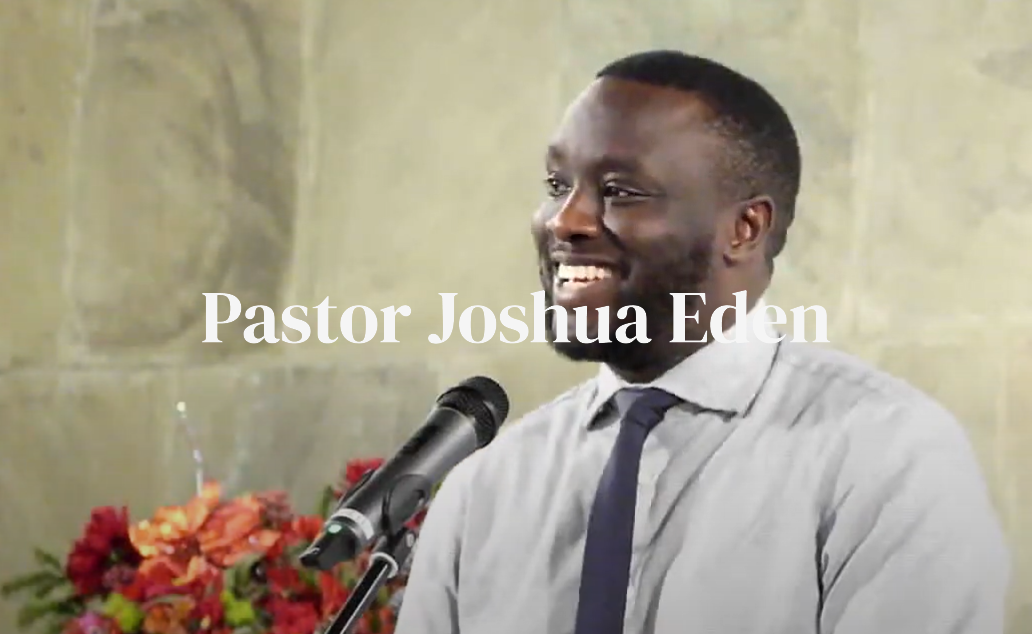What we believe and teach
We are a Reformed, Evangelical Baptist church.
We hold closely to the 1689 Baptist Confession of Faith.
About God
We teach that there is but one living and true God (Deuteronomy 6:4; Isaiah 45:5–7; 1 Corinthians 8:4), an eternal (Revelation 1:8), infinite (Job 11:7–10), absolute Spirit (John 4:24), without parts (Exodus 3:14; 1 John 1:5; 4:8), perfect in all His attributes, including incomprehensibility (Romans 11:33), omniscience (1 John 3:20), omnipotence (Genesis 18:14), omnipresence (Psalm 139:7–10), immutability (Malachi 3:6), and aseity (Exodus 3:14; John 5:26).
We teach that this God is one in essence (having one mind, one will, and one power), eternally existing in three coequal and consubstantial Persons—Father, Son, and Holy Spirit (Matthew 28:19; 2 Corinthians 13:14)—each uncreated and distinct, and each equally deserving worship and obedience. Therefore, we teach that the Father is of none, neither begotten nor proceeding (John 5:26); the Son is eternally begotten of the Father (John 1:14; 1:18; 3:16; 5:26; cf. Psalm 2:7); and the Holy Spirit eternally proceeds from the Father and the Son (John 15:26)
About Salvation
We teach that salvation is wholly of God by grace on the basis of the redemption of Jesus Christ—the merits both of His life of perfect righteousness and His atoning blood—and not on the basis of human merits or works (John 1:12; Romans 5:18–19; Ephesians 1:7; 2:8–10; 1 Peter 1:18–19).
Election
We teach that election is the sovereign act of God by which, before the foundation of the world, He unconditionally chose in Christ all those whom He would ever graciously regenerate, save, and sanctify (Romans 8:28–30; 9:11–16; Ephesians 1:4–11; 2 Thessalonians 2:13; 2 Timothy 2:10; 1 Peter 1:1–2).
We teach that sovereign election does not contradict or negate the responsibility of man to repent and trust Christ as Savior and Lord (Ezekiel 18:23, 32; 33:11; John 3:18–19, 36; 5:40; Romans 9:19–23; 2 Thessalonians 2:10–12; Revelation 22:17). N
Atonement
We teach that the Lord Jesus, by His perfect obedience and sacrifice of Himself, which He offered up to God through the eternal Spirit (Hebrews 9:14; 10:14), has fully satisfied the justice of God (Hebrews 2:17; 1 John 4:10), propitiated the wrath of God (Romans 3:25–26; cf. 1:18), procured reconciliation (Romans 5:10), and purchased an everlasting inheritance in the kingdom of heaven (Hebrews 9:15), for all those the Father has given to Him (John 6:39; 10:14–15, 28–29; 17:2, 9, 24).
Regeneration
We teach that regeneration is a supernatural work of the Holy Spirit by which a renewed nature and spiritual life are given (John 3:3–7; 2 Corinthians 5:17; Titus 3:5). It is instantaneous and is accomplished solely by the power of the Holy Spirit through the instrumentality of the Word of God (John 5:24; James 1:18; 1 Peter 1:23). As a result of this divine illumination (2 Corinthians 4:6), the repentant sinner, so enabled by the Holy Spirit, responds in faith in Christ (1 John 5:1).
Justification
We teach that justification before God is the act of God (Romans 8:33) in which He declares righteous those who, by His irresistible grace, repent of their sins (Luke 13:3; Acts 2:38; 3:19; 11:18; Romans 2:4; 2 Corinthians 7:10; cf. Isaiah 55:6–7), turn to Christ in faith (Acts 16:31; 20:21; Romans 1:16; 3:22, 26; Galatians 3:22), and confess Him as sovereign Lord (Romans 10:9–10; 1 Corinthians 12:3; 2 Corinthians 4:5; Philippians 2:11).
We teach that the righteousness of justification is not infused into the believer, nor is it attained by any virtue or work of man (Romans 3:20; 4:4–6), but that it is the legal declaration of right standing with God (Deuteronomy 25:1; Romans 8:1, 33–34). We teach that justification consists in the imputation of our sins to Christ (Colossians 2:14; 1 Peter 2:24) and the imputation of Christ’s righteousness to us (1 Corinthians 1:30; 2 Corinthians 5:21; cf. Romans 5:18–19), through faith alone apart from works (Romans 3:28; 4:4–5; 5:1; Galatians 2:16; 3:11, 24). In this way, God is “just and the justifier of the one who has faith in Jesus” (Romans 3:26).
Sanctification
We teach that every believer is sanctified (set apart) unto God at conversion, declared to be holy, and is therefore identified as a saint. This sanctification is positional and instantaneous and should not be confused with progressive sanctification. This sanctification has to do with the believer’s standing, not his present walk or condition (Acts 20:32; 1 Corinthians 1:2, 30; 6:11; 2 Thessalonians 2:13; Hebrews 2:11; 3:1; 10:10, 14; 13:12; 1 Peter 1:2).
We teach that there is also, by the work of the Holy Spirit, a progressive sanctification by which the state of the believer is brought into greater conformity with the standing the believer positionally enjoys through justification. Through obedience to the Word of God and the empowering of the Holy Spirit, the believer is able to live a life of increasing holiness in conformity to the will of God, becoming more and more like our Lord Jesus Christ (John 17:17, 19; Romans 6:1–22; 8:29; 2 Corinthians 3:18; 1 Thessalonians 4:3–4; 5:23).
In this respect, we teach that every saved person is involved in a daily conflict—the new creation in Christ doing battle against the flesh—but adequate provision is made for victory through the power of the indwelling Holy Spirit. The struggle nevertheless stays with the believer all through this earthly life and is not completely ended until he sees Christ face to face. All claims to the eradication of sin in this life are unscriptural. Eradication of sin is not possible, but the Holy Spirit does provide for victory over sin (Galatians 5:16–25; Ephesians 4:22–24; Philippians 3:12; Colossians 3:9–10; 1 Peter 1:14–16; 1 John 3:2–9).
Security
We teach that all the redeemed, once saved, are kept by God’s power and are thus secure in Christ forever (John 5:24; 6:37–40; 10:27–30; Romans 5:9–10; 8:1, 31–39; 1 Corinthians 1:4–8; Ephesians 4:30; Hebrews 7:25; 13:5; 1 Peter 1:5; Jude 24). Those who once professed faith and subsequently deny the Lord demonstrate by their going out from us that they were never truly saved in the first place (1 John 2:19).
We teach that it is the privilege of believers to rejoice in the assurance of their salvation through the testimony of God’s Word, which, however, clearly forbids the use of Christian liberty as an occasion for sinful living and carnality (Romans 6:15–22; 13:13–14; Galatians 5:13, 25–26; Titus 2:11–14).
Genuine salvation is manifested by fruits worthy of repentance as demonstrated in righteous attitudes and conduct. Good works are the proper evidence and fruit of regeneration (1 Corinthians 6:19–20; Ephesians 2:10) and will be experienced to the extent that the believer submits to the control of the Holy Spirit in his life through faithful obedience to the Word of God (Ephesians 5:17–21; Philippians 2:12b; Colossians 3:16; 2 Peter 1:4–10). This obedience causes the believer to be increasingly conformed to the image of our Lord Jesus Christ (2 Corinthians 3:18). Such a conformity is climaxed in the believer’s glorification at Christ’s coming (Romans 8:17; 2 Peter 1:4; 1 John 3:2–3).
Separation
We teach that separation from sin is clearly called for throughout the Old and New Testaments, and that the Scriptures clearly indicate that in the last days apostasy and worldliness will increase (2 Corinthians 6:14–7:1; 2 Timothy 3:1–5).
We teach that believers should be separated unto our Lord Jesus Christ (2 Thessalonians 1:11–12; Hebrews 12:1–2) and affirm that the Christian life is a life of obedient righteousness that reflects the teaching of the Beatitudes (Matthew 5:2–12) and a continual pursuit of holiness (Romans 12:1–2; 2 Corinthians 7:1; Hebrews 12:14; Titus 2:11–14; 1 John 3:1–10).
About the Holy Scriptures
We teach that the Bible is God’s written revelation to man, and thus the sixty-six books of the Old and New Testaments, given by inspiration of the Holy Spirit, constitute the Word of God. (1 Corinthians 2:7–14; 2 Timothy 3:16; 2 Peter 1:20–21).
We teach that the Word of God is an objective, propositional revelation (1 Thessalonians 2:13; 1 Corinthians 2:13), infallible (John 10:35), and absolutely inerrant in the original documents, being free from all falsehood, fraud, or deceit (Psalm 12:6; 119:160; Proverbs 30:5).
We teach that the Bible constitutes the only infallible rule of faith and practice and is true and reliable in all the matters it addresses (Matthew 5:18; 24:35; John 10:35; 16:12–13; 17:17; 1 Corinthians 2:13; 2 Timothy 3:15–17; Hebrews 4:12; 2 Peter 1:20–21).
We teach the literal, grammatical, historical interpretation of Scripture, which affirms that, whereas there may be several applications of any given passage of Scripture, there is but one true interpretation. The meaning of Scripture is to be found as one diligently and consistently applies this interpretive method with the aid of the illumination of the Holy Spirit (John 7:17; 16:12–15; 1 Corinthians 2:7–15; 1 John 2:20)
About Man
We teach that man was directly and immediately created by God (Genesis 2:7) in His image and likeness (Genesis 1:26–28; 5:1; James 3:9), free of sin (Genesis 1:31) and endowed with a rational nature, intelligence, volition, and moral responsibility to God (Genesis 2:15–25).
We teach that mankind was created by God as either male or female, distinct sexes that are biologically defined and divinely imparted to each individual at conception (Genesis 1:27; 2:5–23; Job 3:3; Psalm 139:13–14; 1 Corinthians 11:3–15). Attempting to confuse the two sexes is an abomination to God (Leviticus 18:22; Deuteronomy 22:5; Romans 1:26–27; 1 Corinthians 6:9–10).
We teach that God’s intention in the creation of man was that man should glorify God, enjoy God’s fellowship, live his life according to the will of God, and by this accomplish God’s purpose for man in the world (Isaiah 43:7; 1 Corinthians 10:31; Colossians 1:16; Revelation 4:11).
We teach that, in Adam’s sin of disobedience to the revealed will and Word of God, man lost his innocence, incurred the penalty of spiritual and physical death, became subject to the wrath of God, and became inherently corrupt and utterly incapable of choosing or doing that which is acceptable to God apart from divine grace. With no recuperative powers to enable him to recover himself, man is hopelessly lost. Man’s salvation is thereby wholly of God’s grace through the redemptive work of our Lord Jesus Christ (Genesis 2:16–17; 3:1–19; John 3:36; Romans 3:23; 6:23; 1 Corinthians 2:14; Ephesians 2:1–3; 1 Timothy 2:13–14; 1 John 1:8).
We teach that because all men were in Adam—united with him as the representative of humanity—the guilt of sin was imputed and a corrupt nature was transmitted to all men of all ages, Jesus Christ being the only exception (Romans 5:12, 18–19; 8:3; 1 Corinthians 15:22; 2 Corinthians 5:21). All men are thus sinners by nature, by choice, and by divine declaration (Psalm 14:1–3; Jeremiah 17:9; Romans 3:9–18, 23; 5:10–12).
About the Church
We teach that all who place their faith in Jesus Christ are immediately placed by the Holy Spirit into one united spiritual Body, the church (1 Corinthians 12:12–13), the bride of Christ (2 Corinthians 11:2; Ephesians 5:23–32; Revelation 19:7–8), of which Christ is the Head (Ephesians 1:22; 4:15; Colossians 1:18).
We teach that the formation of the church, the Body of Christ, began on the Day of Pentecost (Acts 2:1–21, 38–47) and will be completed at the coming of Christ for His own at the rapture (1 Corinthians 15:51–52; 1 Thessalonians 4:13–18).
We teach that the church is thus a unique spiritual organism designed by Christ, made up of all regenerate persons (i.e., believers) in this present age (Ephesians 2:11–3:6). The church is distinct from Israel (1 Corinthians 10:32), a mystery not revealed until this age (Ephesians 3:1–6; 5:32).
We teach that the establishment and continuity of local churches is clearly taught and defined in the New Testament Scriptures (Acts 14:23, 27; 20:17, 28; Galatians 1:2; Philippians 1:1; 1 Thessalonians 1:1; 2 Thessalonians 1:1) and that the members of the one spiritual Body are directed to associate themselves together in local assemblies (1 Corinthians 11:18–20; Hebrews 10:25).
We teach that the one supreme authority for the church is Christ (1 Corinthians 11:3; Ephesians 1:22; Colossians 1:18) and that church leadership, gifts, order, discipline, and worship are all appointed through His sovereignty as found in the Scriptures. The biblically designated officers serving under Christ and over the assembly are elders (also called overseers and pastors, Acts 20:28; Ephesians 4:11) and deacons, both of whom must meet biblical qualifications (1 Timothy 3:1–13; Titus 1:5–9; 1 Peter 5:1–5).
We teach that the eldership of a local congregation consists of spiritually qualified men who lead or rule as servants of Christ (1 Timothy 2:11–12; 5:17–22) and have His authority in directing the church. The congregation is to submit to their leadership (Hebrews 13:7, 17).
We teach the importance of discipleship (Matthew 28:19–20; 2 Timothy 2:2), the mutual accountability of all believers (Matthew 18:5–14), as well as the need for discipline of sinning members of the congregation in accord with the standards of Scripture (Matthew 18:15–22; Acts 5:1–11; 1 Corinthians 5:1–13; 2 Thessalonians 3:6–15; 1 Timothy 1:19–20; Titus 1:10–16).
We teach the autonomy of the local church, free from any external authority or control, with the right of self-government and freedom from the interference of any hierarchy of individuals or organizations (Titus 1:5).
We teach that it is scriptural for true churches to cooperate with each other for the presentation and propagation of the faith. Each local church, however, through its elders and their interpretation and application of Scripture, should be the sole judge of the measure and method of its cooperation. The elders should determine all other matters of membership, policy, discipline, benevolence, and government (Acts 15:19–31; 20:28; 1 Corinthians 5:4–7, 13; 1 Peter 5:1–4).
We teach that the purpose of the church is to glorify God (Ephesians 3:21) by building itself up in the faith (Ephesians 4:13–16), by instruction of the Word (2 Timothy 2:2, 15; 3:16–17), by fellowship (Acts 2:47; 1 John 1:3), by keeping the ordinances (Luke 22:19; Acts 2:38–42) and by advancing and communicating the gospel to the entire world (Matthew 28:19; Acts 1:8; 2:42).
We teach the calling of all saints to the work of service (1 Corinthians 15:58; Ephesians 4:12; Revelation 22:12).
We teach the need of the church to fulfill her God-given mission as God accomplishes His purpose in the world. To that end, He gives the church spiritual gifts. He gives men chosen for the purpose of equipping the saints for the work of the ministry (Ephesians 4:7–12), and He also gives unique and special spiritual abilities to each member of the Body of Christ (Romans 12:5–8; 1 Corinthians 12:4–31; 1 Peter 4:10–11).
We teach that the Lord’s Supper is the commemoration and proclamation of His death until He comes, and should be always preceded by solemn self-examination (1 Corinthians 11:28–32). We also teach that, whereas the elements of communion are only representative of the flesh and blood of Christ, participation in the Lord’s Supper is nevertheless an actual communion with the risen Christ, who indwells every believer, and so is present, fellowshipping with His people (1 Corinthians 10:16).






